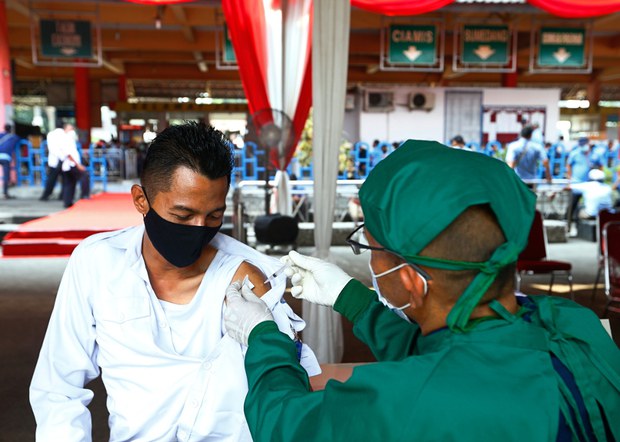Indonesia to Use Soldiers to Ramp up Vaccinations amid Huge COVID-19 Surge
2021.06.14
Jakarta
 A man wearing a protective mask receives a dose of the AstraZeneca COVID-19 vaccine during the mass vaccination program for transportation workers at Kampung Rambutan bus station in Jakarta, June 11, 2021.
A man wearing a protective mask receives a dose of the AstraZeneca COVID-19 vaccine during the mass vaccination program for transportation workers at Kampung Rambutan bus station in Jakarta, June 11, 2021.
Indonesia will involve the military and police to accelerate inoculations, the health minister said Monday, as the average number of daily new COVID-19 cases doubled from a month ago.
President Joko “Jokowi” Widodo wants the vaccination campaign to be ramped up to target 1 million people a day, Health Minister Budi Gunadi Sadikin said, even as epidemiologists expressed doubts this target would be met.
“The president has assigned the TNI and the national police to help administer vaccines to 400,000 people per day,” Budi told a news conference, referring to the Indonesian Armed Forces.
Local governments have been tasked with inoculating 600,000 people daily, he said.
Only about 20 million people in Indonesia have had at least one dose of a COVID-19 vaccine, while around 11 million have been completely inoculated.
Indonesia recorded 8,189 new COVID-19 cases on Monday, taking the total to 1,919,547, amid fears of a second wave similar to the one that devastated India in April-May. The virus-related death toll rose to 53,116 after 237 fatalities overnight.
Daily infections in Indonesia have surged to an average of nearly 7,900 a day in the past week, from an average of 3,500 daily in mid-May, due to people returning to their hometowns to celebrate the post-Ramadan Muslim festival of Eid al-Fitr, which fell on May 13 this year.
Many new infections were also from the highly contagious Delta variant, first detected in India, Budi said. This strain is highly transmissible and causes more severe illness.
“We reported to the president that confirmed cases of the B.1617.2 Delta variant from India has dominated the cases in Kudus, Jakarta, and Bangkalan,” he said.
In Jakarta, active cases rose by 50 percent in the past week, to 18,000, from 11,000 in the previous seven-day period, said the city’s governor, Anies Baswedan.
On Monday, Jokowi called on authorities in the capital to increase the number of people vaccinated daily to 100,000 starting next week, from fewer than 10,000 currently, so that the city could achieve herd immunity by August.
“I have told the governor of Jakarta that by the end of August, 7.5 million residents in Jakarta should have been vaccinated,” Jokowi told reporters. The capital’s population is 10.6 million.
“This is indeed a very ambitious target, but like it or not we have to go for it to achieve herd immunity.”
Dicky Budiman, an Indonesian epidemiologist at Griffith University in Australia, expressed doubt that the government would achieve the target.
“Absolutely impossible. Indonesia’s vaccination rate is very low. Even the U.S., where vaccinations are widespread, has not achieved herd immunity,” Budiman told BenarNews.
Jakarta governor Anies said he was optimistic his administration would be able to vaccinate 100,000 people a day.
“With this, we will have vaccinated 7.5 million people at the end of August,” he said.
He also said the capital might impose stricter mobility measures as the positivity rate had risen to 17 percent from 9 percent and daily cases had risen to more than 2,000 in the last four days.
“If the situation gets out of hand, we will enter a critical phase, and in such a situation we will have to take drastic steps,” said Anies.
‘This is very serious’
Griffith University’s Budiman said he expected this latest surge in COVID-19 infections to peak in early July.
He urged the government to continue to strengthen testing, tracing and treatment to deal with new virus variant that may infect even people who had been vaccinated against COVID-19.
Budiman said the Delta variant was more dangerous because it attacked the immune system even in people who have been vaccinated.
“We still don’t know how long the immunity obtained through vaccination lasts and how effective is the vaccines in preventing the transmission of new variants,” said Budiman.
“What we really need to watch out for is the Delta variant because it meets the super-strain criteria, which can destroy our health system. So, this could be an epidemic disaster in the midst of a pandemic. This is very serious.”
Indonesia wants to vaccinate 181.5 million of its 270 million people to achieve herd immunity early next year. The country has received 93.7 million doses of COVID-19 vaccines, including 84.5 million doses of the jab made by China’s Sinovac Biotech and 8.2 million doses of AstraZeneca.
This month, Jakarta rolled out vaccinations for people 18 years or older, after previously targeting health workers, public service workers and elderly people.
The city’s administration said nearly 2.9 million people in Jakarta had received at least one dose of a COVID-19 vaccine.
Jakarta governor Anies said the capital was preparing a low-cost new apartment complex to be converted into a temporary hospital to treat COVID-19 patients as bed occupancy rates in the capital had reached 75 percent.
“There are more than 2,500 beds that can be used. So now we are moving in stages,” said Anies.
Meanwhile, the athlete’s village in central Jakarta, which has been converted into a COVID-19 hospital, is preparing 2,000 additional beds to anticipate a surge in patients, said Maj. Gen. Ratmono, who is in charge of the facility.
He said the hospital was now treating 4,836 COVID-19 patients.
“We hope that there will be no surge in patients, but we still have to be prepared to ease public worries,” he said.







